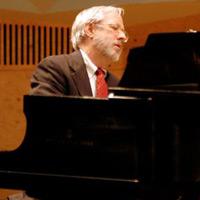 In each issue of this newsletter, we profile a faculty member who makes innovative use of the library or academic technology. This issue features Greg Vitercik, Professor of Music.
In each issue of this newsletter, we profile a faculty member who makes innovative use of the library or academic technology. This issue features Greg Vitercik, Professor of Music.
What is your area of research focus? How did you come to be interested in this/these topic?
The philosophical and political influences that shape Richard Wagner’s Der Ring des Niebelungen. This grew out of my experience teaching the music history sequence for majors here at Middlebury (you have to say something about Wagner…), and was further developed in courses I team-taught with James West exploring “Weimar Culture/Nazi Revolution,” “Totalitarian Cultures,” and “Topics in European Culture and History.”
Why are the library collections and/or staff important to you? What role does it play in helping you with your teaching and/or research?
For classroom work, the physical library collections – books, scores, CDs, and videos are crucial resources, as is the subscription to the Naxos Music Library online. For my own work, interlibrary loan (go.middlebury.edu/ill) has been invaluable, since the necessary materials would not be of much use in an undergraduate library.
Do you incorporate much technology into your teaching?
Only as a vehicle for presentation: Naxos Music Library, YouTube, PowerPoint, etc. I am also perhaps the last holdout still using MiniDiscs – the perfect medium for adding access points to illustrate details of musical form. Many (many) years ago, I had begun developing listening guides in HyperCard to coordinate the music and score-reading with in-depth commentary – I think a bit of one is still shown during orientation. Shel Sax and I taught a Winter Term course in which non-music students created their own presentations discussion Richard Strauss’s tone-poem, Don Juan. The results were a delight. Unfortunately, Apple abruptly ended development of HyperCard and no suitably user-friendly program appeared.
What did you do prior to working at Middlebury College and where were you located?
For completely practical reasons, my wife and I had moved to Milwaukee, Wisc., after my Fulbright year in Berlin, while I wrote my dissertation. We both worked in a used book store notorious for its overwhelming size, disarray, and structural decrepitude. The year I completed my dissertation I got a one-year replacement position at the University of Wisconsin-Milwaukee, and that Spring (in 1986) I was hired by Middlebury. I had so enjoyed the process of writing the dissertation on a KayPro “luggable” computer with a text editor that required coding in formatting for every possible parameter – footnotes were a particular what-you-see-is-nothing-like-what-you’ll-get adventure – that I was tentatively exploring the possibility of going into computer programming.
What is your fondest memory or experience that you’ve had at Middlebury so far?
It hasn’t all been smooth sailing, but watching the department grow – to become the department I dreamed of 30 years ago – has been enormously satisfying. And to remember all of the talented, creative, curious, and wonderfully intelligent students who have touched my life has been a miraculous experience.
If you could give one piece of advice to a new student at Middlebury, what would it be?
Get involved. Stop obsessing about grades. (That is actually two sides of one piece of advice)
What are your plans for the next few years at Middlebury?
Writing that book about the centrality of Ludwig Feuerbach’s philosophy to Wagner’s Ring.
Do you have a favorite place on campus or in town?
Walking toward the Library on the sidewalk from Axinn. What a beautiful campus. I sometimes stop and consider the fact that I have had the privilege of “working” here for half of my entire life.
What is the most significant thing in your life outside of work at the moment?
Our daughter, Ellen; a highly improved version of the two of us.
Is there anything else that you would like to share about your time at Middlebury?
It’s been the fastest 30 years of my life.